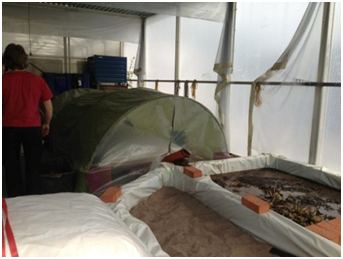Posted: June 17, 2013

Germany is a country that is known for its rich history and excellent food. Many Americans can trace their roots back to a German heritage and many still enjoy traditional meals from their homeland. Our trip to Germany allowed us to take a small peak at their agricultural system. It was very rewarding to see how many things were similar or different compared to the United States. The Germans take pride in where they come from and try not to import anything. Almost everything they eat is grown or raised in Germany and they have sparked a movement of buying what has been produced locally. This idea was carried out throughout our entire visit to Germany.
On our second day in Munich we visited different places where agriculture is used to promote buying and consuming locally. Our first stop was an American fast food enterprise McDonalds. In America we can grow and raise all the food items needed to make a meal for McDonalds. In Germany they can only make about seventy-five to about ninety percent of the materials required for McDonalds. That is still a great number of items that do not have to be imported. The McDonalds also has special items that cater to the likeness of its European customers such as their LOS WOCOS menu catering to a Spanish and Mexican influence. A great fun fact about the McDonalds we visited is that it is one of the world's third or fourth busiest McDonalds feeding over 2,000 people daily during the lunch hours.
Another example of buying and producing locally is the dairy farm industry. All of the farms that we visited have in some form, an automated system that maximized efficiency and milk collection. They all had the same types of cows, fleckled and occasionally a Holstein. The fleckled cows are medium to high milk producers but they can be used for meat, and one of the farms sells their cows to McDonalds. Holstein cows can only be used for milking. They all sell their products  differently but always locally. Another interesting part of the dairy farms was they all had Biogas generators. They all used the methane produced by the cow's urine and manure, as well as other natural ingredients, to make useable energy for the farms and villages nearby. Three things are produced in these generators: electricity, heat, and hot water. All three of these things are shared amount the local villages to reduce the need for imported or "dirty" energy.
differently but always locally. Another interesting part of the dairy farms was they all had Biogas generators. They all used the methane produced by the cow's urine and manure, as well as other natural ingredients, to make useable energy for the farms and villages nearby. Three things are produced in these generators: electricity, heat, and hot water. All three of these things are shared amount the local villages to reduce the need for imported or "dirty" energy.
Another part of German agriculture is the beer industry. There are certain rules that need to be followed that comply with the Reinheitsgebot or beer purity laws. All the beer must only contain water, hops, yeast, and barley. This law has been lifted but many breweries still follow this tradition. We visited one brewery, the Ayinger Brewery, and learned how to comply with the "beer laws". We were showed how the process works right down to where they get their water from. They showed us the whole process from start to finish. One of the most interesting facts was that there are two kinds of yeast and each makes a different beer. Weiss, or wheat beer, uses top fermenting yeast and need to have an open container to ferment correctly. Other beers use bottom fermenting yeast and need to have a completely closed container to ferment correctly. This was then followed by a beer tasting.
Other examples of German agricultural practices were evident in the Heidelberg area. We visited a winery and learned how the grapes grow and add different flavors to the wine. The older the plant the better the taste, and the younger the plant is the less of a taste there is. At out wine tasting we learned how the different grapes make different wines. We also learned how the different wines fit into certain categories based on sweetness and acidity. The German fields have some of the best conditions for growing the grapes needed to make the wine and the landscape bares evidence of it use.
We also saw how chemicals companies and manufacturing plants design products. BASF a chemical company works on how to combat different problems in agriculture. They mostly work with different chemical herbicides, pesticides, fungicides, and insecticides. They have multiple laboratories and test facilities around the world and are always working to solve a problem and help farmers reduce crop loss and maximum productions. We also looked at the John Deere Plant that specializes in farm machinery designed for European fields. These pieces of equipment have different standards and sizes than those manufactured in the United States. They realize farmers have smaller fields and do not need as big and powerful machines to accomplish their daily tasks.
The best tour in my opinion was the Ritter Sport chocolate company tour. I am a Food Science major and am hoping to work for the Hershey Company after I graduate. This tour allowed me to see different aspects in the production of chocolate that I have never seen before. We followed the production from start to finish and had free samplings of freshly made chocolate. This tour makes me want to look into an internship program with them so I can gain more international experience as well as work with my field of study a little more in-depth.
One of the last things we did was talk to agricultural science students from the University of Hohenheim and toured their facilities. We talked about our different school systems and how they are similar. We sheared our thoughts on different agricultural ideas and practices. I talked with one masters Student Axel about how there is still a need to be more environmentally sound with their new practices of clean energy. We later went onto study their biogas research facilities. It was interesting how they were creating a product for engineers without borders for Africa. The students really take pride in what they do and want to do in the future.
Everything we did was not agriculturally based. We had a lot of free time to  explore the cities that we were in. In Munich I went to the Allianz Arena, the home FC Bayern Munchen and 1860 Munich soccer teams, and toured the stadium. I also met up with a friend who I have not seen in almost two years who is stationed in Germany. These two things were the best part of my trip. I am a huge soccer fan and anytime you can tour an international stadium it is worth the time and money to do so. It was also great to meet up with my friend.
explore the cities that we were in. In Munich I went to the Allianz Arena, the home FC Bayern Munchen and 1860 Munich soccer teams, and toured the stadium. I also met up with a friend who I have not seen in almost two years who is stationed in Germany. These two things were the best part of my trip. I am a huge soccer fan and anytime you can tour an international stadium it is worth the time and money to do so. It was also great to meet up with my friend.
Over all my experience of traveling abroad was wonderful. I would do it again in a heartbeat and if I could actually pay for it. It has helped me to work through language barriers and understand different customs from our own. I will hopefully be able to use this experience to find a job and potentially work internationally at some point in my life. I would definitely recommend studying abroad to any student who thinks they may be interested. It leaves a lasting impression in your life and the memories and experiences will last a life time.
Ag Sciences Global
Address
106 Agricultural Administration BuildingUniversity Park, PA 16802
- Email globalag@psu.edu
- Office 814-863-0249
- Fax 814-865-3055
Ag Sciences Global
Address
106 Agricultural Administration BuildingUniversity Park, PA 16802
- Email globalag@psu.edu
- Office 814-863-0249
- Fax 814-865-3055

